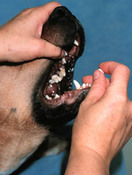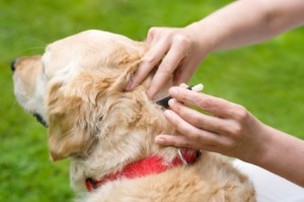Parasite Control

Source: www.willows.uk.net
Why is it important to prevent parasite infestation?
Parasites such as fleas, ticks, intestinal worms and heart worm have the potential to make your dog seriously ill, and can even be fatal. But not only that: some parasites, such as roundworm, can also cause serious sickness in humans. Children are particularly at risk, as they are more likely to play in sand and soil contaminated with feces (http://www.cdc.gov/healthypets/animals/dogs.htm).
How should I prevent parasite infestation?
Your vet will be able to advise you on available products and how to use them.
Below is some information you might find useful for making an informed decision with regards to parasite prevention, particularly avoiding overdosing when using multiple products.
Parasites such as fleas, ticks, intestinal worms and heart worm have the potential to make your dog seriously ill, and can even be fatal. But not only that: some parasites, such as roundworm, can also cause serious sickness in humans. Children are particularly at risk, as they are more likely to play in sand and soil contaminated with feces (http://www.cdc.gov/healthypets/animals/dogs.htm).
How should I prevent parasite infestation?
Your vet will be able to advise you on available products and how to use them.
Below is some information you might find useful for making an informed decision with regards to parasite prevention, particularly avoiding overdosing when using multiple products.
Parasite prevention - a typical schedule
Always discuss your dog's parasite prevention schedule with your vet. The following is for general information only.
Parasites can be classified as external (such as fleas and ticks) and internal (such as intestinal worms and heartworm).
Parasites can be classified as external (such as fleas and ticks) and internal (such as intestinal worms and heartworm).
|
Intestinal worms
The five common intestinal worms against which dogs should be treated are:
Hookworm, roundworm, whipworm, flea tapeworm and hydatid Tapeworm. For more information, have a look at Petalia's information about intestinal worms. Intestinal worming schedule:
- From 2 weeks to 12 weeks of age: every two weeks. - From 12 weeks to 6 months of age: once per month. - From 6 months of age: every 3 months for life. |
Heartworm
Heartworm is not an intestinal worm and requires different preventative treatment.
For more information, have a look at Petalia's information about heartworm. Heartworm prevention can start as early as 7 or 8 weeks, but must be started before 6 months, otherwise a blood test is required, as heartworm infection may have occurred, and it can be dangerous to give an infected dog heartwormer.
Heartwormer is to be given monthly for life, or as an annual injection. |
External parasites
|
The most common external parasites for which preventative treatment exists are:
- Fleas - Ticks - Ear Mites - Sarcoptic Mange Mites - Demodectic Mange Mites For more information see the American Veterinary Medical Association's information on External Parasites. |
External parasite control:
The frequency at which preventative treatment needs to be applied depends on the product, and whether year round protection is required. Usually flea treatment is applied monthly. Fleas can become resistant to certain chemicals, so it's best to ask your vet about which product you should use. Some products only affect adult fleas but don't stop the earlier stage of the life cycle, for which yet another product is required. Discuss the options with your vet. |
How to choose parasite prevention products
There are two general types of parasite prevention products: Those that target a specific type of parasites (intestinal, heartworm, fleas), or those that combine eg prevention of various types, such as a combined heart- and intestinal wormer. They also come in various dispensing forms: tablets, chewables and spot-ons.
Whilst the combined products are often more convenient, there is a risk that either not all parasites are addressed (many don't treat tapeworm), or, if more than one product is used, that you are giving more of a particular chemical than is required to be effective. This can also work out to be more expensive than using separate specific products. Follow these guidelines for selecting your parasite prevention products (in consulation with your vet):
What I use for my dogs
After trying out nearly everything on the market at one point or another, and being a relatively organised person (thanks to Google Calendar), I use separate intestinal and heart wormers, and only use flea prevention in summer, if at all.
Whilst I want to be sure that my dogs are protected against all intestinal worms and heartworm, I try to reduce their "chemical load" as much as possible. Should I ever find a flea on one of them, I'll probably restart monthly flea prevention, but fortunately in over 11 years of dog ownership in this area, and hardly any flea prevention, this has not occurred. Fingers crossed. |
Tablets, chewables or spot-ons?
Tablets

Even if you don't give worming tablets, it's a good idea to get your dog used to taking tablets in case he gets sick and needs them.
Here's a video that shows a few ways to give oral medication. I usually place the tablet far back in their mouth, and then follow up immediately with a yummy treat - they don't even think about spitting out the tablet! If you have trouble handling your dog's mouth, contact us for advice. Chewables

For people who don't like the idea of sticking a tablet down their dog's mouth, chewables are a great alternative. Most dogs will happily chomp down these "treats", but some are fussy. My Whippet will only accept exelpet, but none of the other brands.
Spot-ons
 Source: http://www.fleatreatmenthq.com/flea-drops/
Another "convenient" way of applying parasite control treatment. Please follow the instructions carefully.
Personally I don't use this method if I can avoid it. It leaves large "oily" looking stains on the coat of the dog for several days or longer (my Whippet looks particularly pitiful after this treatment), and rubs off on furniture and anyone's hands who forgot not to pat the dog for several hours ( a rarity in our household). |
